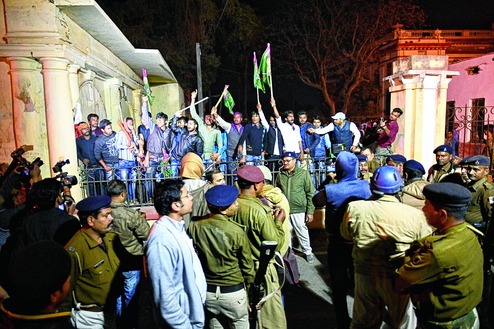
Patna University Students' Union (Pusu) elections have, over the course of the last few weeks, become the proverbial "elephant in the room".
Parents, students and professors alike are finding themselves in the uncomfortable situation of accepting the elections as the inevitable outcome of political awareness created, largely, by happenings across the country post 2014. In Bihar, the latest political "divorce" between Nitish Kumar and Lalu Prasad has made matters spicier.
As a state which boasted of being politically astute in its understanding of the power dynamics, Bihar now is slightly embarrassed to acknowledge any trace of political fervour in the youth. Well, this might not be entirely true but it is especially true for the educated, urban-dwelling, service-class people. In households across Patna, if a college-going teen comes back home to talk about students' union elections, she/he is told to "focus" on studies and, if possible, change her/his company in college! After all, the general studies paper in IAS entrance exams just wants for you to be aware of the facts. It does not necessarily induce you to do something about them.
Anyway, as we know, there has been a frequent postponing of the Pusu elections over the last five years, when the elections were last held. The elections in 2012 were held after a gap of nearly three long decades. There are obvious socio-political reasons for leaving the students without a union in Bihar, but it is unclear why the entire process has become somewhat secretive and hush-hush. There are very few "serious" socio-political platforms which are talking about it. This might be because of the "special status" which elections of any kind in Bihar end up enjoying, or because students are typically told not to get involved in politics which is still considered a breeding ground for goons.
While some political parties like the JDU, BJP and the Congress have launched half-hearted, overused campaigns by their student wings, some enterprising students have also decided to contest independently. The final list of candidates enlists tens of contestants for each post. The real concern is how the students should decide their candidate of choice. The usual campaign tactics of sloganeering, handing out pamphlets, creating caste and/or religious loyalty groups are being utilized in the most efficient manner! There were those who believed that years of absence of students' union would lead to a new and improved political strategizing.
But they were grossly mistaken. Students were expected to bring a refreshing wave of social thought into their campaign but this expectation overlooked the guidance which student groups received from the age-old, formula-based political parties. Thus, while my personal sympathies are oscillating between independent candidates of promise and NOTA (by the way, is there NOTA for Pusu?), many students would be voting as per the general political leanings of their families/elders. Social media and the fury with which messages are forwarded have become defining factors in the victory of the student's union office bearers. On the one hand, it is an excellent way of cost cutting in the light of caps imposed on the total expense by the contesting candidates. On the other, although, it reduces the whole process to a certain economic dominion.
The students who can afford a smart phone would be targeted in a better way. They would get more information about the candidates and, thus conversely, they would also be manipulated easily by good-looking meme messages which either present wrong facts or twist them in the worst way. I find it disturbing that election results depend almost directly on who can make you laugh more! The forwarded messages, which can tickle the funny bone of the students, notwithstanding the inaccuracy of the content, might turn out more efficient campaign materials.
There are numerous Facebook pages with names related to Pusu but the official one has almost 2000 followers. The page offers news regarding the elections and candidatures with a certain amount of objectivity but this is not easy considering the government at the state level (which is now allied with the government at the Centre), might receive some special attention intentionally or otherwise.
In the wake of all this, there are many colleges which don't even know if they are a part of the elections. The student candidates are not allowed to enter the premises of many colleges like Patna Women's College. This throws objectivity and uniformity out the window. But Biharis have never been big fans of either!
By the time this article reaches your breakfast tables, the Pusu results would have been out and democracy would have, yet again, won. Isn't it?
The writer is lecturer, Delhi University, and author of Voter Mata Ki Jai











